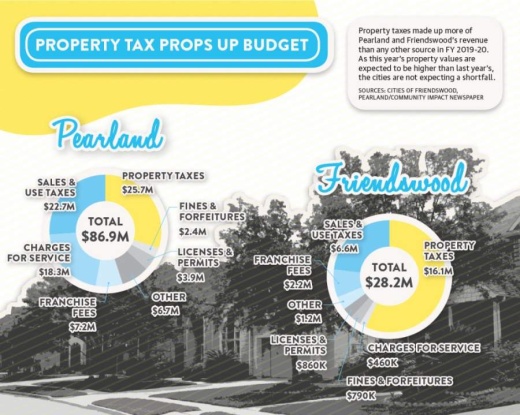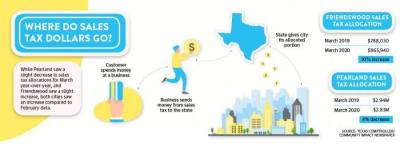“No one knows what the impacts are going to be. I think our focus right now is on fiscal year 2020 and making decisions that put us in the best place for the future,” Pearland Assistant Director of Finance John McCarter said.
Both Pearland and Friendswood are remaining flexible, and they are hoping next year’s budget will not be badly affected. As both cities rely more heavily on property taxes than sales tax to bolster their budgets, leadership in both cities is optimistic. Brazoria County property values are projected to be 13% higher than last year and Galveston County values are projected to be 15% higher, according to appraisal district officials.
“We are very fortunate that property taxes are our main revenue sources,” said Katina Hampton, Friendswood’s director of administrative services.
Both Pearland and Friendswood rely on sales tax for around 20%-25% of the revenue for the general fund budget. According to data from the Texas Comptroller, Pearland saw a slight decrease in year-over-year sales tax allocation in March, while Friendswood saw an increase.
Property values increase
This year’s property tax values have started to trickle in, with numbers first estimated in January. The property valuation estimates will give a good idea of how much money cities have to work with for their budget.“The good news is that the property taxes, which is the largest source of revenue funds, have already exceeded projections, so that will not be affected,” McCarter said.
Since the values that will come in this year are a reflection January’s values, they will be unaffected by the coronavirus, Galveston County Tax-Assessor Collector Cheryl Johnson said.
While values are up this year, Johnson said she is unsure of what values will be in the long run.
During Hurricane Harvey, citizens were able to protest their property values successfully in most cases. While Johnson expects more people to protest this year, she does not think as many will be successful, she said.
“Based on the values I have already seen, I think we are going to have a huge uptick because people are home, and they are going to start calling. They are paying attention, and they are hurting financially right now,” she said.
Manvel resident and real estate agent April Bradshaw said she protests her property values every year, and this year is no exception.
“What I tell all of my clients and friends is that it is your civic duty to protest every year,” she said.
In April, state Sen. Paul Bettencourt, R-Houston, requested the disaster tax exemption be applied to properties that have suffered an economic loss rather than a physical one. Texas Attorney General Ken Paxton ruled the disaster exemption applies only to physical damage, meaning those who are affected financially by the virus are unlikely to be able to lower their property valuations because of it.
“A lot of people have been impacted. I think that word just hasn’t gotten to the right people yet,” Bradshaw said.
Brazoria County Chief Appraiser Cheryl Evans said she is sympathetic, as values were submitted before the virus hit.
“We are very sympathetic but by law this is our job,” Evans said. “We just hate that this pandemic came in March.”
Budget planning
Friendswood and Pearland are both in the process of planning their budgets for next year. A budget may have to come to light before the full extent of the virus is known, both McCarter and Hampton said.“Regardless, we have to send a budget to council in August and adopt by the end of the year,” McCarter said.
Pearland has a strong fund balance, or amount of money without an allocated use, which will help the city deal with the effects of the virus as they become clear, McCarter said. The city also has the option to reallocate funds from this year’s budget into the fund balance with council’s approval, an option that could be proposed to council this summer, McCarter said.
The city’s plan is to be conservative and focus on core services through the virus and afterward.
“We’ll see what happens in the future and be as flexible as we can,” McCarter said.
Property taxes make up around 30% of the budget every year. Pearland lies within Brazoria, Harris and Fort Bend counties, whose values are all expected to be higher this year than last.
Friendswood is in the preliminary stages of formal budget planning but is looking at what it would take to offer its standard level of services next year, Hampton said. Hampton said she hopes to know more by September, when Friendswood would be nearing the end of budget season.
“Naturally, there are concerns. But we’re not overly concerned at this point,” she said.
Sales tax lags
Sales tax allocation numbers for March show Pearland received $2.8 million, a nearly 4% decrease from $2.9 million in March 2019. Friendswood received $865,940, a nearly 10% increase from $788,030 in March 2019. Numbers for April will not be available until June as there is a two-month lag between when sales tax is collected from businesses and distributed to cities.“The immediate impact on this is on sales tax obviously. We don’t see the typical heavy retail we normally see. As this continues, you will see less money in the economy,” McCarter said.
Friendswood’s budget does not rely heavily on sales tax, Hampton said.
“Sales tax is volatile because economic downturn affects that dramatically,” she said. “We are more of a bedroom community.”
A portion of Pearland’s sales tax makes up the majority of the Pearland Economic Development Corp. budget, which PEDC President Matt Buchanan expects will be affected. Although Gov. Greg Abbott allowed some businesses to reopen May 1, business will likely not improve overnight, as customer comfort level is half of the equation, Buchanan said.
“Obviously being open is going to be of benefit to businesses, but next is going to be regaining customers,” Buchanan said. “That’s the key we’ll know here in the next three to four weeks is that acceptance level.”
As the PEDC’s budget goes primarily to major projects, it can scale its projects back, Buchanan said.
“Our sales tax has fluctuated a lot over the last 15 years. Obviously, a lot of it has been positive, but it’s not like we aren’t used to fluctuations,” he said.
As Pearland’s growth over the past decade has brought in more sales tax, it makes the effects of the virus on the city nebulous.
“One thing I think all of us are dealing with is that we are in a really unprecedented time,” McCarter said. “Even looking at the Great Recession in 2009, we were a very different city then.”







